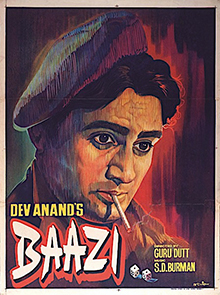| Baazi | |
|---|---|
 Poster | |
| Directed by | Guru Dutt |
| Written by | Balraj Sahni |
| Screenplay by | Balraj Sahni |
| Story by | Guru Dutt Balraj Sahni |
| Produced by | Dev Anand |
| Starring | Dev Anand Geeta Bali Kalpana Kartik |
| Cinematography | V. Ratra |
| Edited by | Y. G. Chawhan |
| Music by | S. D. Burman |
Production company | |
| Distributed by | Navketan Films |
Release date |
|
| Country | India |
| Language | Hindi |
Baazi (English: Gamble) is a 1951 Indian Hindi noir film directed by Guru Dutt. This was the second film of Dev Anand's production house Navketan Films, and as per a commitment given by Dev Anand to Guru Dutt in their days of struggle, the movie was given to Dutt for direction. Baazi was the first crime noir made in the country. It initiated a new genre called "Bombay Noir", the success of which encouraged and defined the later noir films of 1950s and '60s in Hindi cinema. [1] It was the first film in which Dev Anand came up with his unique style of rapid-fire. The film's story was partly inspired by the 1946 movie Gilda . [2] [3]
Contents
The movie stars Dev Anand with Geeta Bali and Kalpana Kartik. It is a crime thriller and had very popular music composed by S.D. Burman. [4] [5] [6] [7] [8]
The film is a tribute to the Forties' Film noir Hollywood with the morally ambiguous hero, the transgressing siren, and shadow lighting. [9] It was hugely successful at the box office and was the second highest grossing film of 1951 after Awaara . [10]
The Times of India called Baazi, "a milestone in the short lived genre that can be loosely called Bombay Noir." It was listed by Filmfare in "Best Bollywood Noir Films of '50s". [11] It is considered one of the Best Noir films to have come from India. [9]